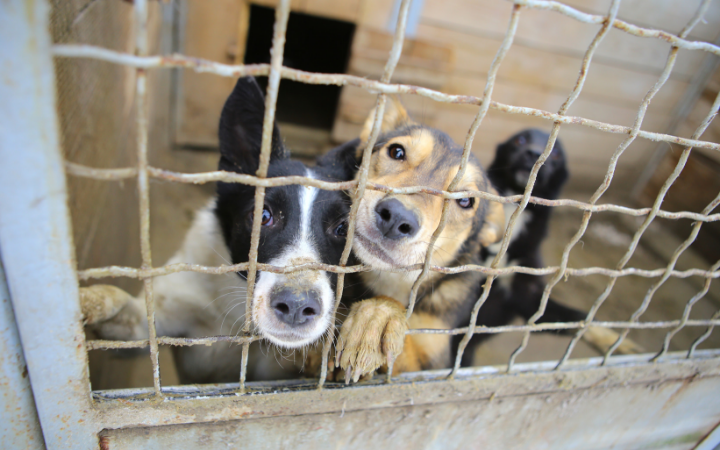So you want to adopt a shelter pet. Great! Now think before you act.
Adopting a pet is a serious decision, especially for military families whose own lives are often in a state of constant change. It is a commitment. Bringing a four-legged family member into your household should never be an impulse decision.
Regardless of your military status, consider these issues before you ask, “how much is that doggie (or kitty) in the shelter?”
A forever home
Do not adopt a shelter pet if you are unprepared to provide a loving home to her the rest of her natural life – period.
In this age of disposable everything – phones, MP3 players, clothes – people forget that an animal is not a toy or an amusement. A pet is a living being who is totally dependent upon his guardian.
Make sure that you are ready to commit to a dog or cat for life before you ever visit an animal shelter. When you adopt a pet and are unable to fulfill this commitment, you have denied that animal the chance to be saved by someone who can.
Pets cost money
A dog or cat is entirely dependent upon its guardians for food, shelter, exercise, and medical care. And most of all, for love.
Before you adopt a shelter pet, educate yourself about typical pet care costs. If you live in an area with a high cost of living, add another 15-20 percent. Do the same if you adopt an animal with special needs or who requires ongoing medical care.
Do not be seduced by low- or no-cost adoption specials at your local shelter. While they do encourage adoptions, they can make you forget that a pet is a serious financial commitment.
Never adopt a shelter pet just because she is free.
Once you understand how much Fido or Fluffy may cost you each year, make this figure a line item in your family budget.
Dog person or cat person?
You probably already know if you prefer dogs or cats, or perhaps you enjoy each equally.
If you have a preference for one type of pet, but your living arrangements only allow you to have another, you have options.
You can wait until you are in a situation where you can have the pet you want. Or you can familiarize yourself with the alternative type of pet to see if you would enjoy having one in your life.
Visit friends and neighbors who have the kind of animal you are thinking about. Ask your local veterinarian for advice, and speak with staff at your local animal shelter. You may even want to volunteer at the shelter to get better acquainted with the kind of pet you are considering.
Training person and pet
Life in the military is all about training, and your new shelter pet will need training, too.
Some animals are surrendered for a variety of reasons, including financial hardship, relocation or other household-related issues. Some dogs and cats are picked up as strays. Still others – tragically – are victims of neglect, abuse or animal cruelty.
Regardless of how your future pet got to the shelter, chances are he will need some training to fit into your home and lifestyle.
When training – or retraining – your newly adopted dog or cat, remember that training pets is equally about training people. You and your family members need to know how to act towards your pet to get the behaviors you desire.
And yes – cats need training, too.
Be prepared to spend time with your new pet to give her the patience she deserves. She probably had a rough life before you gave her a second chance.
Ready to adopt a shelter pet
Once you area ready to adopt a pet for life, it is time to visit the shelter.
At Pets for Patriots, we often use the term shelter to refer to a wide range of animal welfare organizations. This includes shelters, rescues, SPCAs, humane societies, and municipal animal controls.
When you visit the shelter it is vital to bring everyone in your household, including other pets. This will help you find the pet who is the best fit for all members of your home, as well as your lifestyle.
You may need to know if a pet is child friendly, dog- or cat-averse, or has other behavioral or medical considerations that would impact your decision to adopt that particular animal.
Most shelters have a separate, more private ‘meet and greet’ area for you to get acquainted with any adoption candidates.
Remember that a pet’s true personality might not emerge during your shelter visit. But you should get a reasonably good picture of an animal’s basic characteristics.
A dog or cat may be traumatized by shelter life, especially if he is older or spent most of his previous life in a loving home. Some may have been passed over by other would-be adopters and are aloof to protect themselves from possible rejection. Animals do have feelings and are highly sensitive, which is one of the reasons we want them in our lives in the first place.












Hi Pets For Patriots,
You aren’t kidding – it really is the age of disposable everything – and now more than ever it’s important to bring awareness to forever home adoption.
Some people prefer dogs but get a cat because that’s the only pet allowed in a given apartment building. Your advice about either waiting until your living arrangements allow for the dog or to familiarize yourself with cats.
I think that waiting until the lease is up and moving to a dog-friendly building is the better of the two choices.
I’m all for shelter and distressed conditions adoption. These cats and dogs really need the help.
Thanx,
=^-^= Hairless Cat Girl =^-^=
HI BETH,
NO luck with shelters in WA state for a catahoula ( young male) for brother JOE CLYDE RECENTLY widowed ,he is all but given up on these people.
love that kitty……is she ready for me?